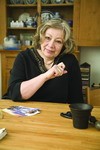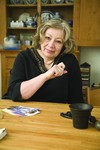
The Desert Lake
Linda Leith
Signature Editions
$19.99
paper
244pp
978-1-897109-21-0
It’s not the first time a place has spurred the Belfast-born author into writing a novel. Living in Budapest prompted Leith to write her first book, Birds of Passage (Signature Editions, 1993). A second book, The Tragedy Queen (Signature Editions, 1995), came from her time in the Montreal suburb of Pointe-Claire. From Paul Bowles to Paul Theroux, writers have always found unfamiliar settings to be fertile ground for a narrative, but for Leith, the connection between place and writing is more personal.
“I’m used to being out of place in the way my character Barbara finds herself in China,” she confesses. “That’s something I have lived in many different ways because I’ve lived in many different places, in none of which I have been at home. Being out of place, being not at home – it’s a great stimulus for me to write because I can make it my own.”
Barbara, a relationships columnist and the protagonist of The Desert Lake, is the quintessential example of a stranger in a strange land. Part of a Canadian contingent of writers touring Beijing, Lanzhou, and Dunhuang, she comically stumbles over almost every cultural boundary she encounters, to the annoyance or amusement of her fellow travellers. Worse still, Barbara’s actual motive for the trip – to resuscitate a floundering relationship – flops when her lover fails to make the flight to China. The situation turns her discomfort into a sort of manic despair caused by her culture shock-a scenario with which many travellers can identify.
Leith’s commitment to accurate detail is readily apparent throughout the novel. From the hectic airport in Beijing, to the scarcity of cold water at a restaurant, to the surreal desert itself, the descriptions ring with an authenticity born of a hands-on approach to fiction.
Leith explains, “I write about places that I can observe because, in some real sense, writing is related to a need to, and a desire to, come to terms with place. The physical descriptions were written more than ten years ago. I always know about where a story is going to take place and what’s interesting there before I know what happens and to whom – those are secondary. Place is certainly central.
“Because Barbara is a writer herself, The Desert Lake is nearly as much about the writing process as it is about its setting. At times, it’s as if Barbara is aware that she’s a character in a novel: “And what she really wanted to know was what chapter this was. The story couldn’t end in this numb state of disbelief. Barbara was still determined to live happily ever after.”
“Barbara is learning to be a writer as she crosses that desert,” Leith says. “Part of that process is travelling across those geographic spaces and coming to terms with those physical places that are very strange to her. And part of it is the process of learning how to write her story. The characters evolved over a 10-year period because I was going through changes and you can only write from where you are at the present time. The novel had to change to reflect what I wanted to say now as opposed to 10 years ago.”
Why did this particular novel take 10 years to write? Astute readers might recognize Leith from her other role, as founder and artistic director of the Blue Metropolis Montreal International Literary Festival, which she started shortly after returning from China. While the festival has kept her occupied since its debut, Leith insists she can keep it distinct from her role as author.
“My writing life is very separate from my Blue Metropolis life, and necessarily so. When I’m writing, I’m in my own imaginative world and I’m inventing. At the Blue Met, I’m playing a different kind of role. It’s creative, but it’s orchestrating. And fun – it’s very social. Writing has absolutely nothing to do with that. It’s solitary.”
I ask if the festival, with its torrent of visiting writers, has influenced her own writing since its inception. “I really don’t think I know of a way in which Blue Metropolis feeds my writing. At some point it might, but not now. It’s been a challenge because it takes so much of my time. My refuge was to be writing my novel. It took me a long time to figure out that I could do that.”
A yearly festival the size of Blue Metropolis also poses a constraint on her time to write and her creative reservoir. How did she manage? “There were times I had to put the novel aside because I simply didn’t have the imaginative space to work on it steadily – sometimes for four months. I write on weekends and I always write in the morning before I go into Blue Metropolis. I just write whenever I can. I make time for that. It is one of the great pleasures of my life.”
For Leith, one of the rewards that came out of writing The Desert Lake was her discovery of Chinese poetry. A startlingly lucid scene in the novel has its characters deconstructing a Wang Wei poem about a hibiscus flower. The poem describes it blossoming not only semantically, but visually, through its Chinese characters. It must have held particular significance for Leith because each of the poem’s five characters denotes a section of the novel. Leith smiles as I mention this.
“Marvelous things happen in the writing process. One of the great, beautiful discoveries I made writing this novel was getting a glimpse of Chinese poetry. That poem is one of the structurally organizing principles of the novel. It made me wish that I did know Chinese because there are such riches there. I was fascinated as a literary person. There is this whole other dimension which we don’t have anything like. Even concrete poetry cannot be visual in the same way as Chinese poetry. Writing is a process of play, in my experience. If you’re writing in Chinese, you’ve just got so much more to play with. It’s a place I don’t belong, even if I learn Chinese.”
I ask if she feels she belongs in Montreal. After all, she came here when she was 13 years old. “I’ve adopted Montreal as my city and I love it,” she admits. “I’ve left it many times and I’ve chosen always to come back. It’s not my place the same way it is for someone born here, but I’m more at home in Montreal than anywhere else.”
mRb







0 Comments